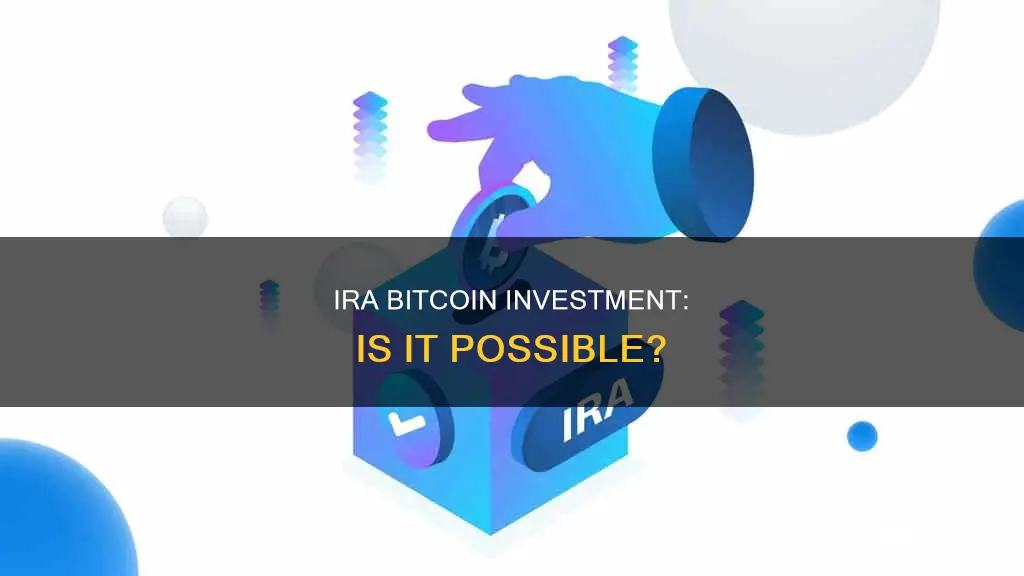
Investing in Bitcoin and other cryptocurrencies for retirement is becoming an increasingly popular option. Bitcoin IRAs are a type of self-directed IRA that allows individuals to hold Bitcoin and other cryptocurrencies within their retirement accounts. These accounts can provide the tax advantages of traditional and Roth IRAs, but it's important to understand the additional IRS rules and regulations that govern this type of retirement account. In this discussion, we will explore the benefits, risks, and considerations of investing in Bitcoin IRAs, including the potential for diversification, tax advantages, and the impact of price volatility on retirement portfolios.
| Characteristics | Values |
|---|---|
| Type of IRA | Self-directed IRA |
| Investment options | Cryptocurrency, real estate, precious metals, collectables |
| Tax advantages | Same as traditional and Roth IRAs |
| Annual contribution limits | $6,500 for 2023, $7,000 for 2024, $7,500 for those 50 or older in 2023, $8,000 for those 50 or older in 2024 |
| Additional fees | Set-up fees, transaction fees, annual account management fees |
| Crypto exchange limitations | Some Bitcoin IRA companies only allow trading on affiliated currency exchanges |
| Price volatility | High |
| No tax-loss harvesting | Yes |
| Retirement planning complexity | Yes |
| Custodians | Banks and other financial institutions for conventional IRAs, specialised crypto custodians for Bitcoin IRAs |
| Secure storage solutions | Cold storage, multi-signature wallets |
What You'll Learn

Crypto IRAs can be expensive to set up and manage, with various fees involved
These fees can add up over time and eat into your investment returns. For example, Bitcoin IRA, one of the popular platforms for Bitcoin IRAs, charges a 2% crypto transaction fee, a 2.99% upfront service fee, and a 0.08% monthly security fee. Another platform, BitIRA, charges a $50 account setup fee and a $195 annual maintenance fee.
It's important to carefully review and compare the fees charged by different providers before choosing a Crypto IRA platform. Some platforms, like iTrustCapital, offer low fees and transparent pricing. iTrustCapital charges a 1% fee per transaction with no monthly fee and no initial purchase fees, broker fees, or scaling based on the size of assets.
Additionally, it's worth noting that traditional IRAs rarely charge any fees, whereas self-directed IRAs, which are necessary for holding cryptocurrencies, typically come with several additional fees, including setup fees, transaction fees, and annual account management fees.
When considering a Crypto IRA, it's crucial to weigh the potential benefits against the costs involved. While Crypto IRAs can provide tax advantages and investment opportunities, the fees associated with setting up and managing these accounts can be significant. Therefore, investors should carefully evaluate their options and choose a platform that aligns with their investment goals and budget.
The Lightning Network: Bitcoin's Future and How to Invest
You may want to see also

Crypto IRAs are not offered by all IRA providers
Since 2014, the Internal Revenue Service (IRS) has considered Bitcoin and other cryptocurrencies in retirement accounts as property. This means that you can’t contribute crypto to your IRA directly, but you can add it to your IRA via purchase. However, few traditional providers of IRAs will allow you to do this.
One workaround is a crypto IRA, which allows you to invest in crypto for your retirement accounts. Crypto IRAs are self-directed IRAs that allow investors to include alternative assets like cryptocurrencies in their retirement portfolios. These IRAs are designed to hold cryptocurrency and can provide the tax advantages of traditional and Roth IRAs.
However, investors should carefully consider whether these accounts are suitable for retirement planning. Crypto IRAs typically come with much higher fees than traditional IRAs, and the extreme volatility of cryptocurrency makes it a poor choice for a retirement investment.
For example, setting up a $50,000 crypto IRA for trading can cost up to $6,000 in charges during the initial setup, depending on the provider. There are also recurring custody and maintenance fees charged by providers of such services, as well as fees associated with individual cryptocurrency trades. A typical provider may charge 3.5% per transaction for each purchase and 1% or a flat fee for each sale.
Additionally, not all IRA custodians offer cryptocurrency investment options, so it is essential to find a custodian that allows for Bitcoin investment in an IRA. Some popular custodians that offer Bitcoin investment options include Bitcoin IRA, BitIRA, and Equity Trust Company.
Overall, while crypto IRAs can provide the benefit of diversification, investors should be aware of the high fees and volatility associated with these types of accounts before deciding to include them in their retirement plans.
Coinbase: A Smart Investment Move?
You may want to see also

Crypto IRAs are not suitable for short-term profits due to age restrictions on withdrawals
This age restriction on withdrawals means that crypto IRAs are not a good strategy if you are looking to make short-term profits on your cryptocurrency investments. The age requirement limits your flexibility to access and use your funds, which may not align with your investment goals and timeline.
Additionally, it's important to consider the volatility of the cryptocurrency market when investing for the short term. Cryptocurrencies like Bitcoin can experience significant price fluctuations, making them a risky choice if you are seeking quick profits. The extreme volatility and associated risks of cryptocurrencies make them more suitable for long-term investments, where there is a potential for growth over time.
Furthermore, crypto IRAs often come with higher fees compared to traditional IRAs. These fees can include initial setup fees, custody fees, trading fees, and annual maintenance fees. The high fees associated with crypto IRAs can eat into your profits, especially if you are investing for a short period.
In summary, crypto IRAs are not ideal for short-term profits due to the age restrictions on withdrawals, the volatile nature of cryptocurrencies, and the higher fees involved. If you are seeking to invest in cryptocurrencies for the short term, there may be alternative investment vehicles that offer more flexibility and lower costs. However, if you are investing for the long term and can withstand the risks and potential drawbacks, a crypto IRA can provide tax advantages and the potential for diversification within your retirement portfolio.
Bitcoin Mining in India: A Guide to Getting Started
You may want to see also

Crypto IRAs can be a good way to save on taxes
Crypto IRAs can be an effective way to save on taxes, offering tax benefits to investors. The tax implications depend on the type of IRA you have—traditional or Roth—and your broader financial strategy.
Contributions to traditional Bitcoin IRAs are typically tax-deductible, up to a certain limit. This means crypto within the IRA is not subject to capital gains tax or income tax. However, you will pay tax when you withdraw at the point of retirement. Traditional IRAs are ideal for those who expect to be in the same or a lower tax bracket upon retirement.
On the other hand, contributions to Roth IRAs are not tax-deductible, but you won't pay any tax when you withdraw your funds. This type of IRA is better suited for those who expect to be in a higher tax bracket at retirement.
Crypto IRAs can help you reduce your capital gains tax bill. The IRS treats crypto as property, so it is subject to capital gains tax, like stocks. However, with a crypto IRA, you can defer these taxes until you withdraw funds from your account. This strategy is particularly beneficial if you expect to be in a lower tax bracket during retirement, as you will pay a lower income tax rate on your withdrawals.
Additionally, self-directed IRAs, which include crypto IRAs, allow you to invest in a wider range of alternative assets, such as real estate, precious metals, and collectibles, which are excluded from conventional IRAs.
It is important to note that fees for crypto IRAs are typically much higher than for traditional IRAs, and the extreme volatility of cryptocurrencies can make them a poor choice for retirement investments, especially for those approaching retirement age. Therefore, it is crucial to carefully consider your financial situation and risk tolerance before deciding to open a crypto IRA.
Dogecoin: Worthy Investment or Risky Business?
You may want to see also

Crypto IRAs are insured and regulated
Crypto IRAs, or Bitcoin IRAs, are self-directed IRAs that allow investors to include cryptocurrencies in their retirement portfolios. These IRAs are insured and regulated, offering investors peace of mind and protection for their digital assets. Here are some key points about the insurance and regulation of Crypto IRAs:
Custodians and Insurance:
- Crypto IRAs require custodians to hold and manage the assets on behalf of the investors. These custodians ensure compliance with IRS rules and provide an extra layer of security.
- Reputable companies like BitIRA, Equity Trust, and Bitcoin IRA offer custodian services and insurance for digital assets. For example, Bitcoin IRA provides up to $700 million in insurance protection.
Security Measures:
- Crypto IRA providers implement robust security measures to protect investors' digital assets. This includes military-grade, multi-key security, multi-factor authentication, multi-encryption, and cold storage solutions.
- BitIRA, for instance, utilizes offline physical keys kept in grade-5 nuclear bunkers protected by armed guards and computer specialists.
Regulatory Compliance:
Crypto IRAs are subject to regulatory oversight by financial authorities. For example, a Crypto IRA may be offered by a regulated state-chartered trust company, which adheres to stringent regulatory standards for financial integrity and security.
IRS Rules and Regulations:
Crypto IRAs must comply with IRS rules and regulations governing self-directed IRAs. The IRS considers cryptocurrencies as property, and they are taxed similarly to stocks and bonds.
Investor Protections:
Crypto IRA providers are required to disclose fees, potential risks, and other relevant information to investors. This transparency helps investors make informed decisions and ensures they are aware of any associated costs.
Fraud Prevention:
Investors should be cautious when choosing a Crypto IRA provider as there have been cases of fraudulent companies claiming IRS approval. Reputable providers will have clear disclosures, transparent fee structures, and partnerships with well-known custodians and insurers.
In summary, Crypto IRAs are indeed insured and regulated. Investors can benefit from the security measures, custodian services, and regulatory compliance that these specialized IRAs offer. However, it is essential to carefully research and select a reputable Crypto IRA provider to ensure the protection of your digital assets.
A Beginner's Guide to Investing via Coinbase
You may want to see also
Frequently asked questions
A Bitcoin IRA is a type of self-directed IRA that is designed to hold cryptocurrency. It can provide you with the tax advantages of traditional and Roth IRAs.
A Bitcoin IRA works similarly to a conventional IRA, except you're buying cryptocurrency instead of mutual funds. You can opt for a traditional IRA or a Roth IRA, and access their substantial tax benefits.
A Bitcoin IRA can enhance your investment returns and provide greater diversification, although it also introduces substantially more risk to your retirement portfolio. Additionally, it can simplify your tax game by eliminating capital gains taxes.







